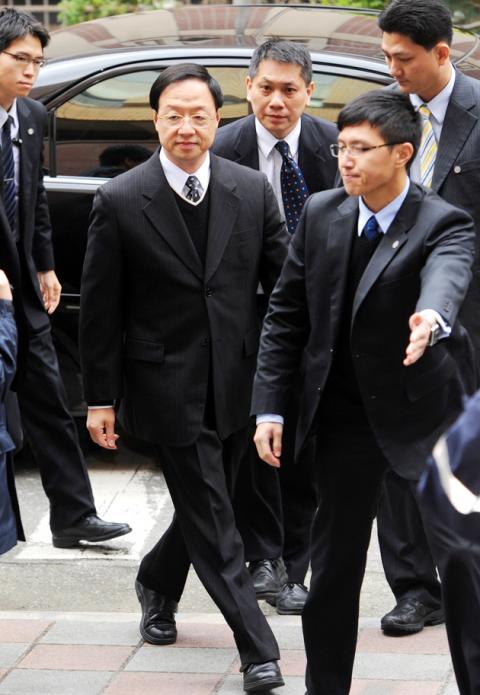|
Disclosure of ‘September strife’
probe demanded
By Shih Hsiu-chuan and Rich Chang / Staff reporters

Premier Jiang Yi-huah enters the
Taipei District Court yesterday to appear as a witness in a case against
Prosecutor-General Huang Shih-ming.
Photo: Lo Pei-der, Taipei Times
The legislature yesterday placed on its
agenda a motion that demands disclosure of all information gathered by an
independent investigation into what the media has called the “September strife”
between President Ma Ying-jeou (馬英九) and Legislative Speaker Wang Jin-pyng
(王金平).
Initiated by the Democratic Progressive Party (DPP) and the Taiwan Solidarity
Union (TSU) at a plenary session yesterday, the motion was placed on the agenda
without any opposition from the Chinese Nationalist Party (KMT).
All the information about the case should be made public so that people would
know what roles Ma and Prosecutor-General Huang Shih-ming (黃世銘), who leads the
Special Investigation Division (SID) of the Supreme Prosecutors’ Office, played
in the case, DPP Legislator Lee Ying-yuan (李應元) said.
“How the prosecutor-general interfered with the case and how the president
meddled in the judiciary should be made transparent and put under public
scrutiny. This is how democracy works and only by doing so can we reform the
judiciary,” Lee said.
The demand was made based on Article 62 and Article 63 of the Constitution
regarding the power of the legislature in deciding “important affairs of the
nation,” the DPP and the TSU said in their joint proposal.
According to legislative rules, the proposal will not be dealt with on the floor
of the legislature until a one-month negotiation period has been concluded.
If accepted, the Ministry of Justice’s Prosecutor Evaluation Committee would
have to present all the information it gathered during its investigation into
the case to the legislature.
The committee concluded its two-month investigation into the case on Dec. 14,
with the 11-member panel finding that Huang violated provisions on leaking
confidential information as he briefed Ma on the case before the SID had
finished its investigation.
In its report, the committee said it would refer Huang to the Control Yuan for
punishment and recommended his dismissal.
In September, the SID accused Wang of exerting improper influence over the
judiciary by asking then-justice minister Tseng Yung-fu (曾勇夫), who later
resigned, not to appeal a breach-of-trust case against DPP caucus whip Ker
Chien-ming (柯建銘) on Ker’s behalf.
The results of the investigation are available online, but not the records of
interviews conducted by the committee.
Committee spokesman Peng Wen-cheng (彭文正) said last night that he supported the
DPP-TSU proposal to release all of the records — a 50cm-thick stack of papers.
Although the Judges’ Act (法官法) stipulates that the records are not to be made
public, there are certain circumstances under which exemptions can be made under
the act and its related bylaws, Peng said.
The investigation should be made public to help clarify the facts in the case,
otherwise those involved would continue to tell only their side of the story,
Peng said.
Asked about the proposal, KMT Policy Committee head Lin Hung-chih (林鴻池)
expressed doubt about whether Article 62 and Article 63 of the Constitution
served as a legal basis for the joint DPP-TSU proposal.
If the proposal is passed by the legislature, it will raise concerns that the
legislature is interfering in the affairs of the committee, Lin said.
Separately yesterday, Premier Jiang Yi-huah (江宜樺) was questioned as a witness at
the Taipei District Court in a case in which Huang has been indicted on charges
of leaking information.
Jiang told the court that he met with the president on the evening of Aug. 31 at
the presidential residence in Taipei after Huang briefed Ma earlier the same
night about the alleged improper lobbying case involving Wang.
Jiang said Ma told him that the investigation had been completed and that the
SID had concluded that Wang was guilty of executive misconduct, but not a
criminal offense.
Asked why Huang went to Jiang’s office and briefed him about the case on Sept.
4, the premier said Huang did so because Ma asked him to.
Jiang said that Huang gave him a report on the investigation during the meeting,
which he has since destroyed.
He said he destroyed the report because it was not an official document and also
because the SID later made public the information during a press conference on
Sept. 6, at which it accused Wang of improper lobbying.
Jiang told the court that if he were Huang, he would also have reported the case
to the president and the premier once the investigation had been completed
because the case concerned Huang’s superior, the legislative speaker and
legislators, and it was a significant matter.
The Taipei District Prosecutors’ Office on Nov. 1 indicted Huang for
contravening the Criminal Code and the Communication Security and Surveillance
Act (通訊保障及監察法).
While Huang briefed Ma on the investigation on the night of Aug. 31 and Jiang on
Sept. 4, it was not until Sept. 5 that the SID concluded its investigation and
decided not to press criminal charges against Wang or Ker.
|
![]()
![]()
![]()